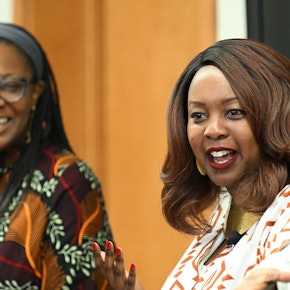Health
Global Health

Leadership, gender equity, youth engagement, strong communities, and actionable research to inform health services are among the core elements of building global health systems that work better for all populations. While it is impossible to ignore alarming trends in reproductive health, the impact of conflicts, and the rise of noncommunicable diseases, a look to the future...

An entire generation of children in some of the world’s poorest countries are now protected against deadly infectious diseases, thanks largely to Gavi: The Vaccine Alliance. Impact: more than 16 million lives saved, vast healthcare cost savings, and greater global health security. A leading force behind the push for equitable access to COVID-19 vaccines, Gavi has played a...

A society that dedicates resources to women is certain to be a healthier society. Ensuring equitable access to education, healthcare, and entrepreneurial opportunities can nurture family well-being and support thriving communities. Yet the pandemic dealt a bitter blow to global progress, sending 47 more million women into extreme poverty, escalating sexual violence, and un...

Environmental stewardship has become as much a watchword in the business sector as it has among activists and advocates. When corporate executives start talking about the importance of ecosystems, regenerative agriculture, and responsible product sourcing, and NGOs promote innovative financing mechanisms that forgive national debt in exchange for funding conservation activ...

You likely remember Selma Blair as the ingenue in Cruel Intentions or the preppy ice queen in Legally Blonde, but her most important role to date might be as a disability advocate. Outspoken about her own diagnosis of multiple sclerosis, she shares her raw and intimate story by way of her New York Times best-selling memoir, Mean Baby. Join her for a rare on-stage conversat...

Inequitable and untimely responses to COVID-19 and other pandemics. Disproportionate health impacts of climate change in Africa. Unequal financing mechanisms. Lack of reliable data and information. A dearth of leadership guided by human-centered values. These are a few of the many challenges that stand in the way of global health and development systems that work for all....

A Conversation with Xavier Becerra, Interviewer: Kate Snow; A Conversation with Pavlo Kovtoniuk, Interviewer: Elizabeth Cohen; A Conversation with Deepika Chopra, Interviewer: Nicholas St. Fleur

Virtual Presentation: Imagine a doctor being able to watch, in real time, as white blood cells attack cancer cells in a patient, or seeing exactly how the leukocytes replicate as they fight off the cancer. It would fundamentally change how they understand and treat disease. Today, the technologies that would enable this kind of understanding do not exist—nor do the academi...

In its landmark 2002 study, Unequal Treatment, the Institute of Medicine (IOM) stated bluntly that racial and ethnic minorities receive lower-quality health services than white Americans. Two decades after the IOM called out structural racism, the devastating toll remains apparent in the uneven risks associated with COVID, diabetes, asthma, cancer, stroke, and pregnancy. P...

While vaccine development was swift to combat COVID-19, just 60% of the global population has been fully immunized and viral variants remain a deadly threat, underscoring the importance of strengthening the “last mile” in vaccination. Ensuring equitable access to vaccines, overcoming structural obstacles to distribution, and combatting vaccine hesitancy will require cross-...

How crowd-sourcing can unravel a medical mystery.

The latest infectious disease scare: Should we be alarmed?

From the skewed impact of climate change on the nations that have contributed least to the problem to financing mechanisms that allow primary care services to languish in the poorest countries, inequitable patterns in global health and development are all too evident. To radically reimagine healthcare systems, we need to acknowledge lingering colonialism and commit to exti...

The impact of climate change is dire: floods, drought, fire, hurricanes, deforestation, degraded water systems, agricultural devastation, and refugee crises. No one will escape the health effects, as respiratory, cardiovascular, and infectious disease rates rise, water and food shortages widen, and mental health harms escalate. But communities with weak infrastructure, fra...

Sixty percent of American adults, and 75 percent of children, have been infected with SARS-CoV2. Coupled with immunity-boosting vaccines and medical progress, rates of severe disease, hospitalization, and death are all falling dramatically. Can we declare victory and move on? Or do the threats still facing vulnerable populations require continued precautions? The prospect...

Eighteen months after a COVID-19 vaccine became available, high-income countries had administered more than 200 doses per 100 people; in low-income countries, the figure was almost 90 percent less. Access to diagnostics and therapies has been likewise constricted, underscoring the imperative of new approaches to global health equity. Investing in local manufacturing and sc...

A giant in global public health who dedicated his life to championing equity, Paul Farmer’s death in Rwanda this year at the age of 62 is a heartbreaking loss. Passionate, blunt, and inspirational, he was a physician, an activist, an anthropologist, a mentor, a father, and a husband who rooted his work on the unshakeable principle that all people should be valued equally....

Anyone who has ever had a pet understands how deeply connected human beings are to the animals who serve as our companions, lessen our stress, and perhaps offer a buffer against cognitive decline. Puppy play date, anyone? Honeybees help to protect our food supply, vision-impaired people rely not only on seeing-eye dogs but also on seeing-eye horses, and animal research has...

Who is vulnerable, how bad does it get, how long does it last?

For decades, public health experts warned of a coming pandemic and developed recommendations to prepare—yet when it arrived, the response was a catastrophic failure. With better surveillance, perhaps we could have slowed the worldwide spread of the virus. Had the threat become less politically charged, a consensus-driven strategy might have slowed it down. Certainly, stron...

